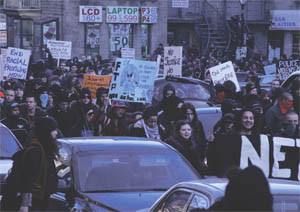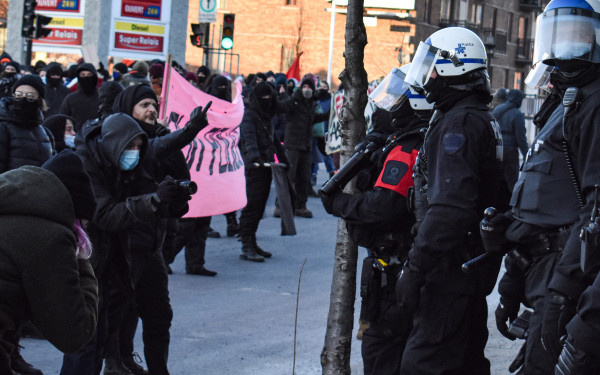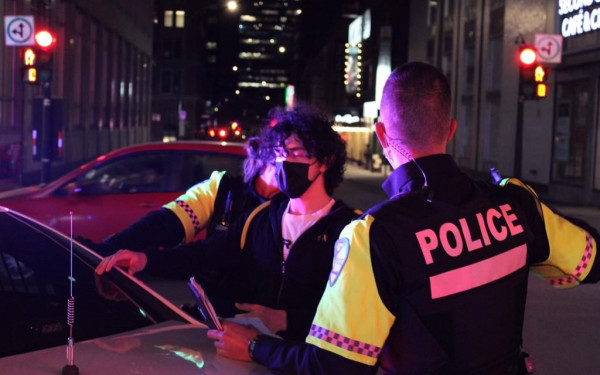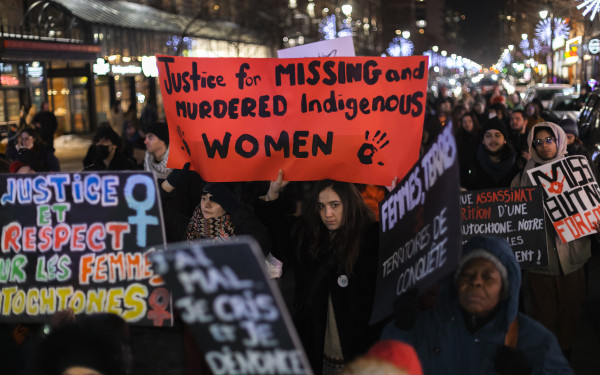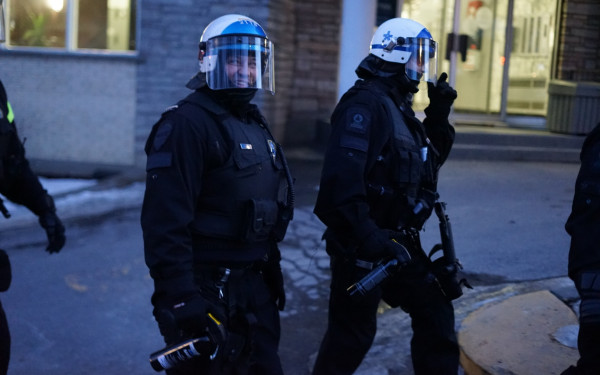Kettle to the Metal
A Close Up View of an Arrest at the Anti-Police Brutality Demonstration
The cop was dressed in full riot gear, from his white and blue helmet to his heavy-duty black boots.
He was holding dozens of black plastic strips in his hands. One by one, he pulled them taut through a loop. They made a sound like a zipper on steroids, and next thing you know, he wasn’t holding a plastic strip, but a pair of plastic handcuffs.
Somebody in the crowd I’m boxed in with called him “The Cuffmaster.” At what is usually a busy intersection in the Plateau, we waited as the master of the cuffs practiced his craft. Black plastic strip. Pull. Zip. Handcuffs.
One of those pairs was meant for me.
It had been over an hour since the 15th annual Anti-Police Brutality Demonstration had been dispersed by the Service de police de la ville de Montréal. Trapped in a kettle of riot shields and demonstrators, I had no idea that 258 people would be arrested that night. I had even less idea that I was going to be one of them. This, needless to say, was not how I had intended to spend my Tuesday night.
On March 15, hundreds of people gathered for the protest against police brutality. Running late, I approached the protest from the rear. Ahead of me, before I could catch a glimpse of a single “No Justice, No Peace” placard, I saw police cars, ambulances and dozens of police officers slowly moving down St. Denis Street.
The SPVM officers were dressed to the hilt: riot shields, visors and body armour. This was a sight more intimidating than the normal sky-blue uniform of the SPVM. A police helicopter whined like a mosquito overhead, shining a searchlight over the area.
A smashed storefront was my first indicator that there was a confrontation brewing. Of course, I knew that this annual event in particular usually degenerated into violence of one form or another. In 2010, over 100 protesters, including three The Link staff, were arrested following clashes with the police that saw rocks thrown in exchanges with tear gas canisters and rubber bullets.
Though the march has been held annually since 1997, this year’s iteration had a more specific focus than the general subject of excessive force. The Fredy Villanueva shooting is still a fresh wound for many in the Montreal community. Villanueva’s brother Dany is contesting a deportation order issued last year, with a court date in April. There’s also the long-awaited inquiry into the death of Michel Berniquez, who died of a heart attack in police custody in 2003. It was announced in February that the coroner will finally begin an investigation as to whether Berniquez, who had a history of drug addiction, died because of police actions.
As I made my way along the sidewalk, I heard several loud bangs and saw smoke starting to billow out of the crowd. The police were firing what I thought was tear gas, but what turned out to be stun grenades—non-lethal explosives that temporarily blind and deafen those in the vicinity of their impact. As I sprinted closer to get a better look, officers began blocking off the sidewalk, holding me back. Knowing there was little chance of talking my way through, I patiently waited to see if I’d get a chance to get a bit closer, taking photos and videos on my cell phone.
As I waited, a small no man’s land formed between the rear echelon of marchers and the police. There was a brief moment of lightheartedness as a few of the protesters began to dance on the asphalt, coming within range of the riot police batons. Rocks and blocks of ice sailed over the dancers’ heads as people in the crowd behind them launched projectiles at the still stoic police.
A cop on the sidewalk noticed me loitering about and told me to either pass him or get out of the area. I thanked him as I walked past, joining a crowd of spectators further up the street.
It would be a decision I would regret very shortly.
More cops blocked the sidewalk right ahead. Across the street, I saw a group of people run into an apartment building, followed shortly by a swarm of police. It was then that the police started moving in on a group of about 100 people at the rear end of the march, surrounding them from all sides. I was a part of that group.
Pushed onto the street, I was given ample time to wonder about what was happening.
An hour passed, with those of us stuck in this group—which I later learned was called a kettle, in riot control terms—milling about, trying to figure out when we would be set free. I struck up a few conversations, asking why people had shown up to the protest. The answers fell into two general categories. “I was on my way somewhere, saw the march, asked what it was about, and joined in,” was the more popular explanation, though there were more than a few “Fuck the police!” responses.
Finally, we heard a police sergeant’s voice over a megaphone. She informed us, first in French and then in English, that our gathering was illegal and that we were to be arrested. I didn’t catch the reason, as it was drowned out by the loud collective groan from everyone inside the kettle.
I never thought I’d say this, but waiting to be arrested is the most boring thing I have ever done. You just wait and wait, not sure when it will finally be your turn to be cuffed and searched.
I passed the time by updating friends and colleagues on my status via texts, Twitter and Facebook, reassuring them that I was fine and asking for updates on the Habs game. I tried asking a few cops if they knew the score, but none of them were very conversational.
To deal with the boredom, some protesters returned to chants used during the march. One particularly clever one went, “You’re sexy, you’re cute, take off your riot suit.” I’m not that clear on how mass public nudity would have helped the cause, but it was certainly a catchy refrain.
When the chants ran dry, a few of the younger people in the crowd led us in rousing renditions of NOFX and Bad Religion songs. That segued into Gloria Gaynor’s “I Will Survive.” Despite the fact that most of the people I spoke to were novices at dealing with this particular kind of situation, the mood was generally calm.
“It’s not my first protest, but it’s my first time being arrested,” said one Concordia student I met in the crowd.
“I’m supposed to be at home working on a paper,” she added wistfully.
I asked a cop what it was we were being charged with. “Blocking traffic,” he said, almost apologetically. “It’s pretty easy to get out of that,” he quickly added.
I asked him how the cops who are tasked with keeping order feel about protests like these. “Just a part of the job,” he replied, somewhat wearily.
I wanted to tell him and his fellow officers that I wasn’t an anarchist or a black bloc extremist, nor was I blocking traffic until I was pushed from the comfort of the sidewalk onto the street. Hell, I’m not even a protester; I’m a reporter. I tried to explain that to a friendly-looking cop. He shrugged behind his riot shield. There was nothing he could do.
Now that everything was under control, the aura was less police state and more red tape. They were going to process every one of us in an orderly fashion if it took them all night. City buses started pulling up and speculation in the crowd turned to where exactly they were going to send us.
Finally, it was my turn. One officer politely requested that I put my hands behind my back. I complied and felt the tightening of rigid plastic against my wrists. He unzipped my coat, revealing the Superman t-shirt I was wearing.
“Hey,” he shouted. “I have that same t-shirt. Superman is a cool dude.”
I smiled politely as he continued searching me, emptying the contents of my pockets and backpack into a clear plastic garbage bag. As he led me towards one of the city buses, my jacket fell from around my shoulders. Noticing this, the officer gave me a motherly warning.
“You have to be careful, you’ll catch a cold,” he said reproachfully, as he adjusted my coat.
As I was loaded onto a bus, a number was written in dark black marker on my hands and on the bag with my possessions, and I was guided to a seat near some fellow arrestees. Once the bus was filled, we pulled out on our way to be booked.
We drove for what seemed like an hour, though it was probably no more than twenty minutes. The bus was filled with scruffy punk kids, all rubbing their heads against the metal hand rails, trying to reach now-unscratchable itches. Cops waited on us like armed flight attendants, helping those whose jackets had slipped or whose glasses were falling down their noses. My wrists started to ache from the chafing from the cuffs. When I got home that night, I had a fresh pair of matching bruises that wouldn’t begin to fade for a few days.
Finally, we reached a police station in the East End, far from any Metro station, let alone the downtown core where we had started marching. The cops asked us who was under 18. A chorus of “Moi, moi” rose from the back of the bus, where the minors had congregated.
“No, no, raise your hands,” said the cop in French. We groaned, grudgingly appreciating the bad joke.
After all the minors had been led off the bus one by one, a police officer gestured at me, indicating he wanted me to get off the bus. As I rose, he grabbed my stuff from under my seat, and led me to the hood of a police car parked next to the bus, headlights on. I gave him my name and address, and he began filling out some forms. After he finished, he handed me over to another cop, who spun me around. I felt a jerk on my arms, and then, finally, I could move my hands again. Another officer walked over and handed me my ticket. The damage: $488.
I was so glad to have my cuffs off the ticket didn’t immediately bother me. I said to the officer, “I don’t give a shit about the ticket. I’m just so fucking happy that those cuffs are finally off.” He seemed mildly surprised that I had been wearing them for over two hours.
I was led to a brick wall and told to stand in front of it. I was handed a piece of paper with my information on it and told to hold it up.
I’ve seen enough cop movies to know what to do, and they took three mug shots of me. With that done, I was given my backpack and possessions and told that I was free to go. There was a bus there to take me to the closest Metro station.
My time as an arrestee had come to an end.
The moral of the day? Show up on time, avoid the handcuffs.

